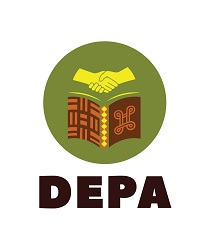Aims of the DEPA Project
Many African countries have experienced long-standing war and conflict, despite ongoing peacebuilding efforts. Peace education—essential for preventing and reducing conflict—has had limited impact, partly because its pedagogies and curricula often rely on Eurocentric and liberal frameworks. Although there is growing momentum to decolonise African curricula, this has largely remained at the level of critique rather than practical implementation.
DEPA seeks to address this gap by developing teaching materials grounded in local knowledge, cultural values, and community understandings of peace, with a particular focus on supporting those most affected by conflict.
Four initial Proof of Concept projects were carried out in Nigeria, South Africa, Uganda, and Zimbabwe. These projects strengthened collaboration between African partners and UK institutions. Local teams worked with a wide range of groups and settings, including Internally Displaced People (IDP) camps, refugee settlements, faith-based organisations, community groups, and multiple education contexts such as higher education, secondary schools, vocational training, and informal learning spaces. Insights from these early projects informed the next phase of the programme, which funded eleven additional projects in Algeria, Burundi, the Democratic Republic of Congo, Cameroon, Ethiopia, Ghana, Kenya, Mozambique, Sierra Leone, and Zambia.
Across all sites, project teams used diverse arts and humanities research methods including storytelling, Social-Emotional Learning (SEL), theatre, PhotoVoice, and indigenous art forms to collaboratively create photographs, drawings, and other visual materials. A continent-wide dance collaboration was also undertaken, drawing on data from all projects to create a unifying artistic expression of the work.
Country Projects
Through its multi-faceted approach, the Decolonising Education for Peace in Africa (DEPA) project has built a vibrant network of educators, researchers, policymakers, NGOs, and other stakeholders across the continent.
The project aims to create long-term impact by producing the first set of peace education research and teaching materials developed through a South–North partnership and rooted in Global South perspectives. All research data will be freely archived, ensuring that future researchers and practitioners have open access to these resources.
More information about all the DEPA projects can be found on the Projects Page.
Meet the DEPA Team
Coming soon!

